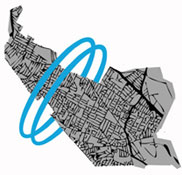
| Between February 2009 and December 2010, we spoke to hundreds of people about the future. A few dozen of these people were nice enough to make predictions about the future. Some of these predictions took the form of elaborate short stories, or intricate drawings or maps. Click on their names to see what these participants submitted to the project. (Note: to see these predictions in context, click on "Timeline & findings", above.)
|
My prediction for Somerville 2015 by Maureen Barillaro: After the permit parking and meter increases of 2010, combined with long delays and cost overruns of the MBTA Greenline project, in addition to the rising cost of gas due to peak oil production, and the massive flood of 2012 in Assembly Sq from rising sea level due to climate change, Somerville finally takes on alternative transportation as a model for cities across the globe. Citizens no longer able to afford "big 3" cars, gas and fees seek alternate transportation, and small business entrepreneurs and the city join to offer a wide variety of transport services. Beginning in 2011, bike taxis pop up all over the city starting with stands at all MBTA stations. Market Basket adds several stands and offers coupons to customers for the much needed service to alleviate parking and traffic headaches all hours of the day at it's Somerville Ave. location. All shopping centers soon follow suit. Metro-Pedal Power expands its tricycle trucks to a fleet of 20, with delivery services of all kinds of goods to the thousands of carless residents. The city decides to encourage more bike riding by putting bike racks in parking spots and putting a bike lane on every street in the city. Businesses add bike racks and plant much needed trees and stormwater runoff absorbers in the thousands of now unused parking spots. Small specialty shops open up in neighborhoods to provide basic services, just like the way it used to be. In 2013, finally fed up with the unreliability of the MBTA buses, Somerville unveils it's own citywide transportation system at a fraction of the cost of the Greenline. The city adds a small fleet of hybrid fueled passenger vans and using current bus-stops, continuously circle the city so that residents never have to wait more than 5 minutes for a ride. With fully equipped GPS capabilities, citizens can easily track the vehicles so they are aware of timing and delays. The cost is a mere $1 so people widely accept this transport and are grateful the city is providing this service. Zip Car expands
widely to meet the needs of travel outside of the city and people
continue to give up their vehicles by the thousands. Residents turn
unused paved driveways into raised bed gardens and neighbors trade
seeds at spring block parties. Air quality and children's health
improves almost immediately. With less cars on the road, families
feel safer to take family bike rides, especially to the newly cleaned
up Mystic River walkway. Here at the Mystic River families can enjoy
boating, birdwatching, picnicing, gardening and riverside sports.
The river area is practically spotless with Somerville's aggressive
campaign "Don't Mess with Somerville" to reduce waste
and litter and increase awareness of the dangers of trash in our
waterway. Restaurants, stores and schools are banned from using
any styrofoam products which have littered our streets and riverway
for many decades. Recycle bins are added across the city and recycling,
composting and trash reduction are embraced by the entire community
when they see how clean the streets are and even pitch in by picking
up a hapless piece of trash. Store-owners participate by eliminating
plastic bags, putting up "Don't mess with Somerville"
signs in the stores to discourage littering, and reduce the amount
of waste given to customers overall. People make healthy choices
by choosing food and other products with the least amount of packaging
and are ahead of most of the country by the time all of this is
federally mandated in 2020. (source:
Maureen Barillaro)
|